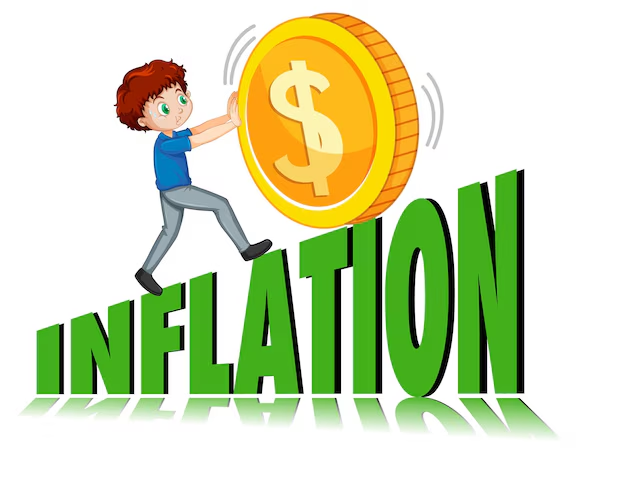Inflation is an economic condition where the general price level of goods and services rises over time, reducing the purchasing power of money. In times of high inflation, what you could buy for $100 today might cost more tomorrow. As a result, protecting your money from inflation becomes essential to preserving your wealth and ensuring long-term financial security. Below are several strategies you can use to safeguard your money from the eroding effects of inflation.
1. Invest in Inflation-Protected Assets
Certain assets are known to perform well during periods of inflation. These investments can act as a hedge, meaning they typically rise in value when inflation is high.
- Stocks: Historically, stocks have been one of the best ways to protect against inflation. Many companies can pass on higher costs to consumers in the form of price increases, allowing them to maintain profits and dividends.
- Real Estate: Real estate investments, particularly rental properties, can provide a reliable source of income that keeps pace with inflation, as rental prices often increase over time.
- Inflation-Protected Securities: In the U.S., Treasury Inflation-Protected Securities (TIPS) are government bonds that adjust their principal value based on changes in the Consumer Price Index (CPI), which is a measure of inflation.
2. Diversify Your Investment Portfolio
Diversification involves spreading your investments across various asset classes to reduce risk and improve returns. By holding a mix of assets, you can protect your portfolio from the volatility caused by inflation.
- Foreign Stocks and Bonds: Consider investing in international markets. Countries with lower inflation rates or stronger currencies can offer protection if your home country’s inflation rate is high.
- Commodities and Precious Metals: Commodities such as oil, gold, and silver tend to rise in value during inflationary periods, as their prices are often driven by increased demand or currency devaluation.
3. Invest in Real Assets
Real assets are physical assets that hold intrinsic value and often appreciate in line with inflation.
- Precious Metals: Gold, silver, and other precious metals have historically been seen as a store of value. Gold, in particular, is considered a safe haven during times of economic uncertainty.
- Collectibles and Fine Art: Certain tangible assets, such as rare collectibles, antiques, and fine art, may retain or increase in value over time, outpacing inflation.
- Land and Agricultural Assets: Farmland and timberland can be effective hedges against inflation, as the demand for food and natural resources typically increases over time.
4. Adjust Your Savings Strategy
While traditional savings accounts may not keep pace with inflation, there are strategies to ensure your savings maintain their purchasing power.
- High-Yield Savings Accounts: Look for high-yield savings accounts or certificates of deposit (CDs) that offer higher interest rates than traditional savings accounts. While they may not completely offset inflation, they provide better returns.
- Inflation-Linked Savings Products: Some banks and financial institutions offer inflation-linked savings products that adjust interest rates based on inflation, providing a more direct way to protect savings.
- Cryptocurrencies: Some people turn to cryptocurrencies like Bitcoin as an inflation hedge. Though volatile, cryptocurrencies have gained popularity as a way to protect against currency devaluation.
5. Reduce Debt and Avoid Fixed-Rate Debt

Inflation can affect various aspects of the economy, including interest rates. One way to protect your finances is by managing debt wisely.
- Pay Off High-Interest Debt: If you have outstanding debts, particularly those with high-interest rates, paying them off can help you free up more money to invest and build wealth. High interest can become even more burdensome during inflationary periods.
- Refinance Fixed-Rate Loans: While inflation can cause interest rates to rise, locking in low-interest rates on mortgages or other loans through refinancing can help protect you from higher payments in the future.
6. Be Strategic About Spending
How and when you spend your money can also help mitigate the effects of inflation.
- Stockpile Essentials: Buying essentials like non-perishable goods or products you use regularly can help you take advantage of current prices before they rise.
- Delay Major Purchases: If possible, delay purchasing big-ticket items until the inflationary period subsides. This can help you avoid paying higher prices as they rise due to inflation.
- Seek Discounts and Shop Smart: Use coupons, take advantage of sales, and consider buying generic or store-brand products to reduce your overall expenses during inflationary periods.
7. Increase Your Earning Potential
One of the most effective ways to protect against inflation is to increase your income, ensuring that your earning power keeps up with rising costs.
- Pursue Career Advancement: Seek promotions, negotiate salary increases, or pursue new job opportunities that offer better compensation to stay ahead of inflation.
- Invest in Skills and Education: Continually improving your skills through education or professional development can help you stay competitive in the job market and secure higher-paying roles.
- Side Hustles and Passive Income: Consider starting a side business, freelancing, or investing in assets that generate passive income, such as rental properties or dividend-paying stocks.
8. Monitor Inflation and Economic Indicators
Staying informed about the economic environment can help you anticipate inflationary trends and adjust your financial strategy accordingly.
- Track Inflation Rates: Regularly check inflation rates and economic indicators to get an idea of whether inflation is likely to rise or fall.
- Consult Financial Advisors: Seek advice from financial professionals who can help you navigate inflationary periods and provide guidance on how to adjust your portfolio or strategy.
Conclusion
Inflation is an inevitable part of the economy, but by implementing these strategies, you can protect your money and ensure that your wealth grows or at least maintains its value. Whether through investing in inflation-resistant assets, diversifying your portfolio, managing your debt, or increasing your income, there are several ways to reduce the impact of inflation on your finances. The key is to stay informed, plan ahead, and adapt to changing economic conditions.
FAQs
1. How much inflation is considered “normal”?
A moderate inflation rate of around 2% per year is typically considered normal by most central banks and economists. However, inflation rates can fluctuate based on economic conditions.
2. Can I rely solely on high-yield savings accounts to protect against inflation?
While high-yield savings accounts can offer better interest than traditional savings, they may not fully offset inflation. It’s important to combine them with other investment strategies for better protection.
3. Is gold a good hedge against inflation?
Gold has historically been seen as a safe haven during inflationary times because it tends to retain its value as the purchasing power of fiat currency declines. However, it can be volatile and should be part of a diversified portfolio.
4. How can I protect my money if inflation continues to rise?
If inflation continues to rise, you may want to focus on real assets, stocks, inflation-protected securities, and commodities. Additionally, you can reduce debt and increase your income to stay ahead of inflation.
5. Should I invest in cryptocurrencies to protect against inflation?
Cryptocurrencies like Bitcoin are considered by some as a hedge against inflation due to their scarcity and decentralized nature. However, they are highly volatile and speculative, so they should be approached with caution and as part of a broader investment strategy.


